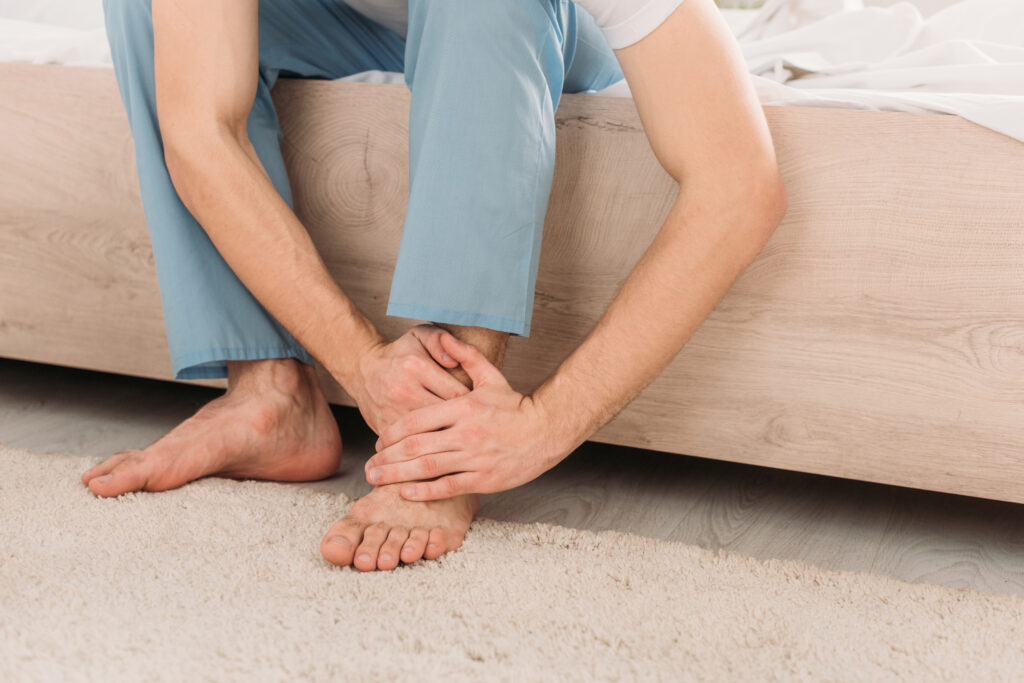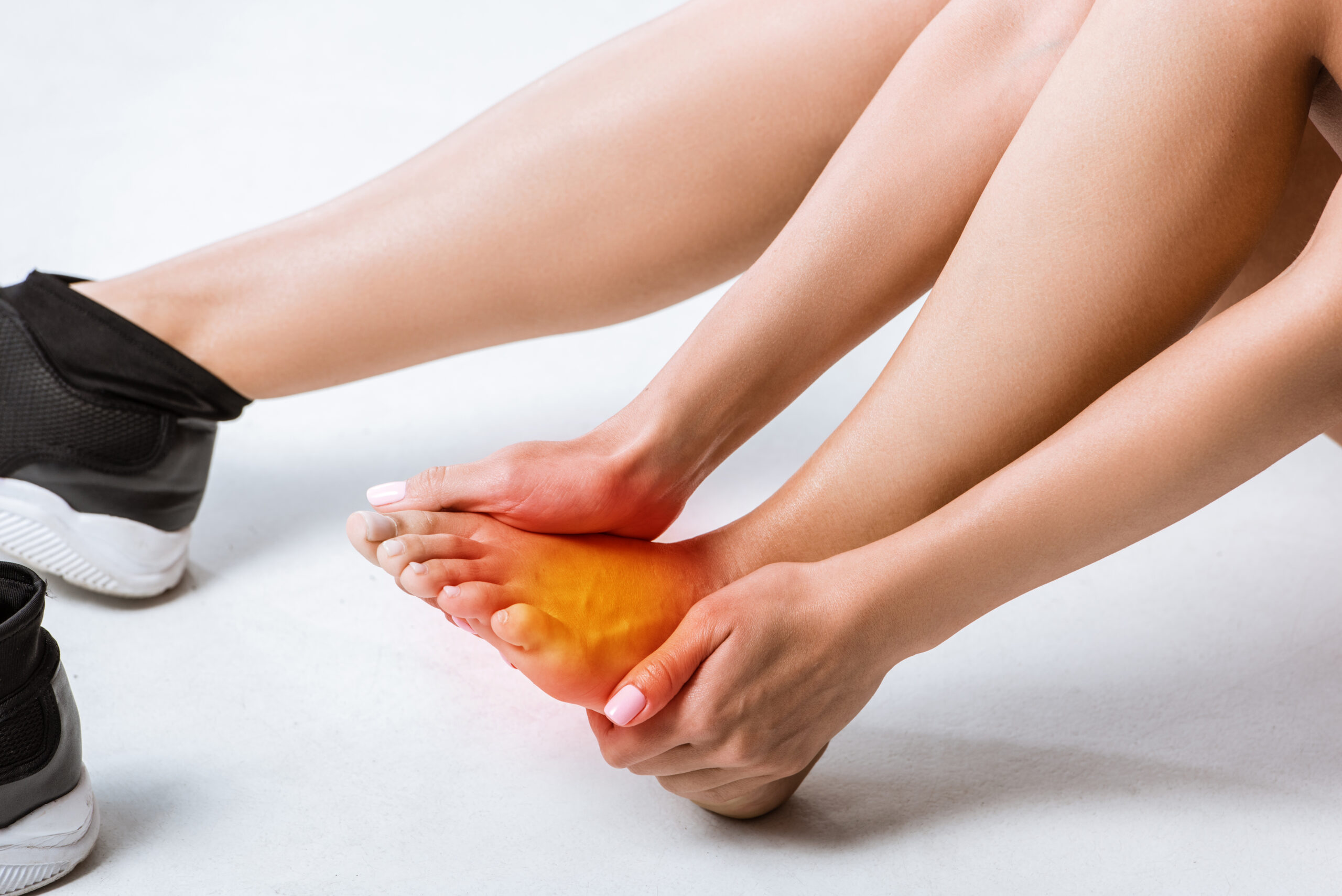Healthy feet often travel miles each day. You use them to get up and down supermarket aisles, climb stairs, and walk on the treadmill, among other things. Any pain or discomfort in your feet can really slow you down and impact your life. Let’s talk about foot pain, what to do if you have it, and whether it’s time to see an Essex County foot pain specialist.
Essex County Foot Pain Specialist | Are You Dealing With Foot Pain?
Shoes Causing Foot Pain:
A lot of different things can cause foot pain, including those stiletto heels you couldn’t resist passing by the shoe store window at the mall. Wearing poorly fitting or high-heeled shoes day after day can squeeze and pinch your feet until they start to hurt. For example, shoes that are too narrow can cause bunions and swollen bumps at the base of your big toe. Wearing shoes that are too tight can curl your toes until they look like a claw. That’s called a hammer toe.
When your feet rub against your shoes, you can get areas of thickened skin called calluses or corns. And too much pressure from your shoes on the soles of your feet can create an opening for a viral infection called plantar warts. If your shoes aren’t a problem, you may have one of several conditions that cause foot pain. Arthritis, a fractured or broken bone, gout, tendinitis, plantar fasciitis can all make your feet hurt. You’re more likely to have foot problems as you get older, and your joints wear down. Being overweight puts extra pressure on your feet, which can also lead to pain.
Home Treatment for Foot Pain:
So, what do you do if your feet hurt? That depends on what’s causing your pain. Sometimes you can treat foot pain at home. For example, you can hold ice to your foot to bring down swelling and take an over-the-counter pain reliever such as ibuprofen or acetaminophen. Try to keep off the painful foot as much as you can. Sit with your feet raised until they start to feel at least a bit better.
Wearing foot pads and other shoe inserts may also help your feet heal and prevent future pain. Sometimes you’ll need to see a doctor, especially if the pain is due to an injury, or it’s severe, or it hasn’t improved after a couple of weeks of treatment at home. Your Essex County foot pain specialist can examine your feet, diagnose the problem, and remove any growths like warts, corns, or calluses. A foot doctor can also treat a broken or fractured bone. Depending on how serious the problem is, you may even need surgery to treat it.
 Foot Pain Prevention:
Foot Pain Prevention:
There are ways to prevent foot pain before it can start-like being careful when you exercise. Working out is great, but you never want to run or jump hard enough to damage your feet. Losing weight can also help take some of the pressure off of your feet. Probably the kindest thing you can do for your feet is to wear comfortable shoes. Your shoes should fit properly, supporting and cushioning your feet while leaving plenty of room for your toes to wiggle around. So, when you’re shoe shopping, leave the stilettos on the shelf, and reach for a comfortable, attractive option instead. Your feet will thank you by not causing you pain.
Foot Pain Causes:
Foot pain may be due to:
- Aging
- Being on your feet for long periods of time
- Being overweight
- A foot deformity that you were born with or develops later
- Injury
- Shoes that fit poorly or do not have much cushioning
- Too much walking or other sports activity
- Trauma
- Arthritis
- Gout, big toe, which becomes red, swollen, and very tender.
- Broken bones.
- Bunions: A bump at the base of the big toe from wearing narrow-toed shoes or from abnormal bone alignment.
- Calluses and corns: Thickened skin from rubbing or pressure. Calluses are on the balls of the feet or heels. Corn appears on the top of your toes.
- Hammer toes: Toes that curl downward into a claw-like position.
- Fallen arches: Also called flat feet.
- Morton neuroma: A thickening of nerve tissue between the toes.
- Nerve damage from diabetes.
- Plantar fasciitis.
- Plantar warts — Sores on the soles of your feet due to pressure.
- Sprains.
- Stress fracture.
- Nerve problems.
- Heel spurs or Achilles tendinitis.
Home Care for Foot Pain:
The following steps may help relieve your foot pain:
- Apply ice to reduce pain and swelling.
- Keep your painful foot elevated as much as possible.
- Reduce your activity until you feel better.
- Wear shoes that fit your feet and are right for the activity you are doing.
- Wear comfortable, properly fitting and supportive shoes, with good arch support and cushioning.
- Wear shoes with plenty of room around the ball of your foot and toes and a wide toe box.
- Avoid narrow-toed shoes and high heels.
- Wear sneakers as often as possible, especially when walking.
- Replace running shoes frequently.
- Warm up and cool down when exercising. Always stretch first.
- Stretch your Achilles tendon. A tight Achilles tendon can lead to poor foot mechanics.
- Increase your amount of exercise slowly over time to avoid putting excessive strain on your feet.
- Wear foot pads to prevent rubbing and irritation.
- Use over-the-counter pain medicine, such as ibuprofen or acetaminophen. (Talk to your health care provider first if you have a history of ulcer or liver problems.)
- Stretch the plantar fascia or the bottom of your feet.
- Lose weight if you need to.
- Learn exercises to strengthen your feet and avoid pain. This can help flat feet and other potential foot problems.
When to Contact a Essex County Foot Pain Specialist:
Contact your provider if:
- You have sudden, severe foot pain.
- Your foot pain began following an injury, especially if your foot is bleeding or bruising, or you cannot put weight on it.
- You have redness or swelling of the joint, an open sore or ulcer on your foot, or a fever.
- You have pain in your foot and have diabetes or a disease that affects blood flow.
- Your foot does not feel better after using at-home treatments for 1 to 2 weeks.
What to Expect at Your Essex County Podiatrist Visit:
Your podiatrist will do a physical exam and ask questions about your symptoms and medical history. You’ll then get X-rays or an MRI may be done to help your podiatrist diagnose the cause of your foot pain. Treatment depends on the exact cause of the foot pain. Treatment may include:
- A splint or a cast if you broke a bone
- Shoes that protect your feet
- Removal of plantar warts, corns, or calluses by a foot specialist
- Orthotics, or shoe inserts
- Physical therapy to relieve tight or overused muscles
- Foot surgery
Looking for a Highly-Experienced & Knowledgable Foot Pain Specialist in the Essex County, New Jersey Area?
Are you looking for a NJ foot and ankle specialist to help with your bone spurs? Dr. Manooj Prasad at Garden State Foot & Ankle Group of Toms River is a highly-experienced podiatrist with an ardent mission to help those suffering from foot, ankle, and lower leg issues. He offers personalized care while considering each patient’s individual lifestyle needs so that the best possible treatment can be administered. Based in both Essex County and Ocean County in New Jersey, service towns include Belleville, Montclair, Bay Head, Millburn, Short Hills, Toms River, Lakehurst, Jackson, Livingston, Maplewood, Verona, Roseland, Lakewood, Essex Fells Cedar Grove, Manchester, and many more! For more information, you can contact us today at (732)557-9900 (Toms River) 973)450-3035 (Belleville) or explore our website.
.

0 Comments